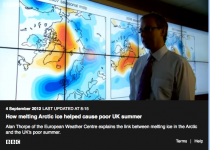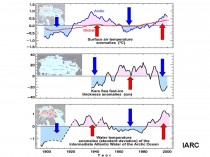Update: See the “Boy who cried warming” here.
---------------
Submitted by Nick Sundt on Fri, 09/07/2012 - 09:33
In this video from the BBC, Alan Thorpe of the European Centre for Medium-Range Weather Forecasts (ECMWF) explains how declining Arctic sea ice and warming north Atlantic sea surface temperatures are contributing to shifts in the atmosphere that are disrupting summer weather in the U.K.
According to the BBC: “The summer of 2012 was the second wettest in the UK since records began - and the wettest summer in 100 years - according to the Met Office. The bad weather could be blamed in part on the path of the jet stream being further south than usual. Alan Thorpe of the European Weather Centre explained the early stages of research into the link between melting ice in the Arctic and the UK’s poor summer. “ The findings are further evidence that the warming of northern ocean waters and the closely linked decline in Arctic sea ice already are resulting in substantial disruption of weather patterns in the northern mid-latitudes in North America, Europe and Asia.

See video here.
In a statement issued by the European Centre for Medium-Range Weather Forecasts (ECMWF) (Arctic sea-ice and poor summer weather, 7 September 2012), ECM
“We suspect that declining Arctic sea-ice cover in summer has an association with lower pressure over the UK if there are also higher than normal sea-surface temperatures in the north-west Atlantic. In these circumstances we expect there to be an increased risk of the north- having relatively poor summer weather - wet, cool and windy. This is part of a long-term and large-scale pattern called the Arctic Oscillation that means the UK’s weather can be affected by events far remote from our shores.
The Arctic Oscillation is associated with changes to the position of the jet stream such that during this summer the UK and was in the path of a series of storms. However, there are many other factors that determine our summer weather and the year-to-year and decade-to-decade variability is large. This is why at ECMWF we use what is called ensemble prediction where the range of possibilities is explored by performing 51 parallel forecasts starting from slightly different conditions.”
Yes all true, but greenhouse gases have nothing to do with the arctic changes. They are driven by cycles in the oceans.

See how the arctic ice and temperatures vary in tandem with the Atlantic 60 year cycle.
Enlarged

See how actually both the Pacific and Atlantic cycles tie to arctic ice and temperatures
Enlarged
See why the arctic changes could be explained by natural variability here.




